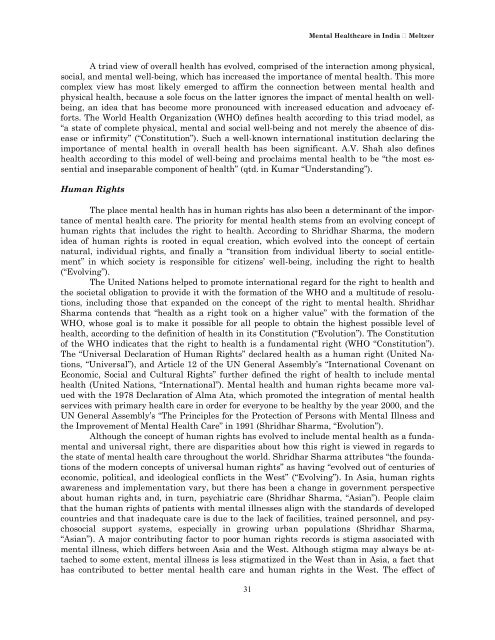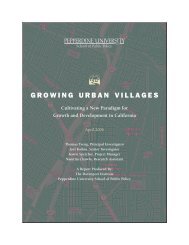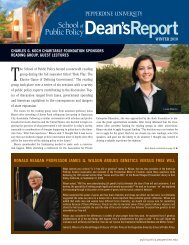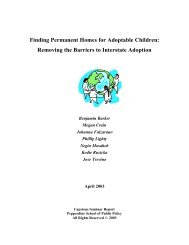Pepperdine University School of Public Policy
Pepperdine University School of Public Policy
Pepperdine University School of Public Policy
You also want an ePaper? Increase the reach of your titles
YUMPU automatically turns print PDFs into web optimized ePapers that Google loves.
Mental Healthcare in India Meltzer<br />
A triad view <strong>of</strong> overall health has evolved, comprised <strong>of</strong> the interaction among physical,<br />
social, and mental well-being, which has increased the importance <strong>of</strong> mental health. This more<br />
complex view has most likely emerged to affirm the connection between mental health and<br />
physical health, because a sole focus on the latter ignores the impact <strong>of</strong> mental health on wellbeing,<br />
an idea that has become more pronounced with increased education and advocacy efforts.<br />
The World Health Organization (WHO) defines health according to this triad model, as<br />
“a state <strong>of</strong> complete physical, mental and social well-being and not merely the absence <strong>of</strong> disease<br />
or infirmity” (“Constitution”). Such a well-known international institution declaring the<br />
importance <strong>of</strong> mental health in overall health has been significant. A.V. Shah also defines<br />
health according to this model <strong>of</strong> well-being and proclaims mental health to be “the most essential<br />
and inseparable component <strong>of</strong> health” (qtd. in Kumar “Understanding”).<br />
Human Rights<br />
The place mental health has in human rights has also been a determinant <strong>of</strong> the importance<br />
<strong>of</strong> mental health care. The priority for mental health stems from an evolving concept <strong>of</strong><br />
human rights that includes the right to health. According to Shridhar Sharma, the modern<br />
idea <strong>of</strong> human rights is rooted in equal creation, which evolved into the concept <strong>of</strong> certain<br />
natural, individual rights, and finally a “transition from individual liberty to social entitlement”<br />
in which society is responsible for citizens’ well-being, including the right to health<br />
(“Evolving”).<br />
The United Nations helped to promote international regard for the right to health and<br />
the societal obligation to provide it with the formation <strong>of</strong> the WHO and a multitude <strong>of</strong> resolutions,<br />
including those that expanded on the concept <strong>of</strong> the right to mental health. Shridhar<br />
Sharma contends that “health as a right took on a higher value” with the formation <strong>of</strong> the<br />
WHO, whose goal is to make it possible for all people to obtain the highest possible level <strong>of</strong><br />
health, according to the definition <strong>of</strong> health in its Constitution (“Evolution”). The Constitution<br />
<strong>of</strong> the WHO indicates that the right to health is a fundamental right (WHO “Constitution”).<br />
The “Universal Declaration <strong>of</strong> Human Rights” declared health as a human right (United Nations,<br />
“Universal”), and Article 12 <strong>of</strong> the UN General Assembly’s “International Covenant on<br />
Economic, Social and Cultural Rights” further defined the right <strong>of</strong> health to include mental<br />
health (United Nations, “International”). Mental health and human rights became more valued<br />
with the 1978 Declaration <strong>of</strong> Alma Ata, which promoted the integration <strong>of</strong> mental health<br />
services with primary health care in order for everyone to be healthy by the year 2000, and the<br />
UN General Assembly’s “The Principles for the Protection <strong>of</strong> Persons with Mental Illness and<br />
the Improvement <strong>of</strong> Mental Health Care” in 1991 (Shridhar Sharma, “Evolution”).<br />
Although the concept <strong>of</strong> human rights has evolved to include mental health as a fundamental<br />
and universal right, there are disparities about how this right is viewed in regards to<br />
the state <strong>of</strong> mental health care throughout the world. Shridhar Sharma attributes “the foundations<br />
<strong>of</strong> the modern concepts <strong>of</strong> universal human rights” as having “evolved out <strong>of</strong> centuries <strong>of</strong><br />
economic, political, and ideological conflicts in the West” (“Evolving”). In Asia, human rights<br />
awareness and implementation vary, but there has been a change in government perspective<br />
about human rights and, in turn, psychiatric care (Shridhar Sharma, “Asian”). People claim<br />
that the human rights <strong>of</strong> patients with mental illnesses align with the standards <strong>of</strong> developed<br />
countries and that inadequate care is due to the lack <strong>of</strong> facilities, trained personnel, and psychosocial<br />
support systems, especially in growing urban populations (Shridhar Sharma,<br />
“Asian”). A major contributing factor to poor human rights records is stigma associated with<br />
mental illness, which differs between Asia and the West. Although stigma may always be attached<br />
to some extent, mental illness is less stigmatized in the West than in Asia, a fact that<br />
has contributed to better mental health care and human rights in the West. The effect <strong>of</strong><br />
31












